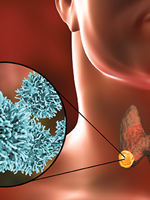Thyroid Cancer
Thyroid cancer is the most common form of endocrine malignancy and its incidence is increasing. Thyroid cancers usually present as painless nodules found upon palpation, and nodules >1 cm should be evaluated as they have a higher potential for being clinically significant cancers. Read More ›
RET is a tyrosine kinase receptor that, when fused with a partner molecule, activates oncogenic activity. RET abnormalities are found in both papillary and medullary thyroid cancers and are promising targets for treatment. Read More ›
Medullary thyroid cancer (MTC) accounts for 5% of all thyroid cancers. The only curative treatment option for MTC is surgery, but understanding of the RET pathway and the development of therapies targeting this pathway may improve outcomes for these patients. Read More ›
Papillary thyroid cancer is the most prevalent thyroid cancer, accounting for 80% of thyroid cancer diagnoses. Prognosis is good for patients with early and aggressive treatment, and the new and emerging therapies targeting the RET pathway may improve outcomes for patients with advanced disease. Read More ›
Among patients with radioiodine-refractory advanced or metastatic thyroid cancer, tyrosine kinase inhibitors are guideline recommended. New RET-specific kinase inhibitors have recently demonstrated positive outcomes for these patients. Read More ›
This section provides a brief overview of new cancer drugs or new indications
approved by the FDA between May 26 and June 15, 2020. Read More ›
On January 29, 2020, Eli Lilly announced that the FDA granted priority review to their New Drug Application for selpercatinib (LOXO-292) for the treatment of patients with advanced RET fusion-positive non–small-cell lung cancer, RET-mutant medullary thyroid cancer, and RET fusion-positive thyroid cancer. The FDA is aiming to provide its decision on the approval of selpercatinib in the third quarter of 2020. Read More ›
By Corbin Davis
Although the FDA approval of the 2 kinase inhibitors, lenvatinib (Lenvima) and sorafenib (Nexavar), has improved progression-free survival (PFS) rates, the responses to treatment with these agents are not durable and more treatments are needed.
Read More ›

